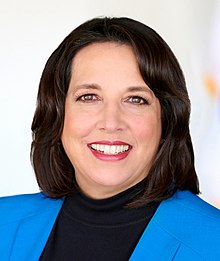
Back Liste der Vizegouverneure von Massachusetts German マサチューセッツ州副知事 Japanese Lieutenant Governor of Massachusetts SIMPLE
| Lieutenant Governor of the Commonwealth of Massachusetts | |
|---|---|
 | |
since January 5, 2023 | |
| Government of Massachusetts | |
| Style | His Honor/Her Honor |
| Status | Deputy officer |
| Member of | Governor's Council Cabinet |
| Reports to | Governor of Massachusetts |
| Residence | None official |
| Seat | State House, Boston, Massachusetts |
| Nominator | Nominating petition, Political parties |
| Appointer | Popular vote |
| Term length | Four years, no limit |
| Constituting instrument | Constitution of Massachusetts |
| Formation | Original post: April 30, 1629 Current form: October 25, 1780 |
| Salary | $165,000 (2018) |
| Website | https://www.mass.gov/person/kim-driscoll-lieutenant-governor |
The lieutenant governor of Massachusetts is the first in the line to discharge the powers and duties of the office of governor following the incapacitation of the Governor of Massachusetts. The constitutional honorific title for the office is His, or Her, Honor.
The Massachusetts Constitution provides that when a governor dies, resigns, or is removed from office, the office of governor remains vacant for the rest of the four-year term. The lieutenant governor discharges powers and duties as acting governor and does not assume the office of governor.[1] The first time this came into use was five years after the constitution's adoption in 1785, when Governor John Hancock resigned his post five months before the election and inauguration of his successor, James Bowdoin, leaving Lieutenant Governor Thomas Cushing as acting governor.[2] Most recently, Jane Swift became acting governor when Paul Cellucci resigned in 2001 to become the U.S. Ambassador to Canada.[3]
When the governor is outside the borders of Massachusetts, the lieutenant governor exercises the power of the governor. Historically a one-year term, the office of lieutenant governor now carries a four-year term, the same as that of the governor. The lieutenant governor is not elected independently, but on a ticket with the governor. The 1780 constitution required a candidate for either office to have lived in Massachusetts for at least seven years immediately preceding election, own at least £1,000 worth of real property and to "declare himself to be of the Christian religion". However, only the residency requirement remains in effect, and both men and women have served in the office.[1][4] Amendment Article LXIV (1918) changed the election from every year to every two years, and Amendment Article LXXXII (1966) changed it again to every four years. The office is currently held by Kim Driscoll, who was inaugurated in January 2023.
- ^ a b Cite error: The named reference
constitutionwas invoked but never defined (see the help page). - ^ Hall, Van Beck (1972). Politics Without Parties: Massachusetts 1780–1791. Pittsburgh, PA: University of Pittsburgh Press. pp. 136–138. ISBN 978-0-8229-3234-5. OCLC 315459.
- ^ "April 9 letters to the editor".
- ^ Amendments: Article VII removed the religious oath, Article XXXIV removed the property requirement,
